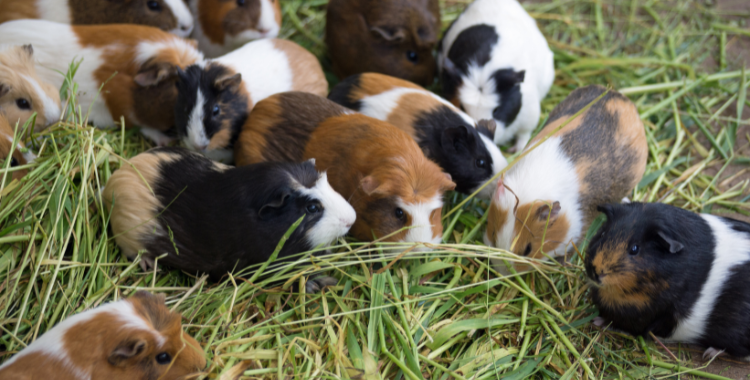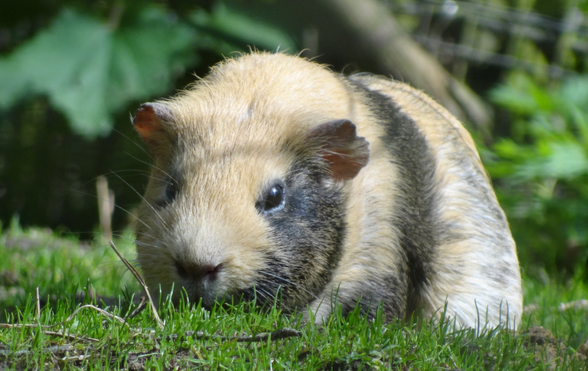Keeping guinea pigs cool in the summer and warm in winter is important if you’re thinking of keeping them outside. We cover this and much more such as security, health and diet considerations. Keep reading to learn more.
Is your Guinea Pig insured? Get a quote for up to £2,000 of vet fee cover | Insure up to 3 pets per policy | We’ve been insuring exotic pets since 1996 | Check out our customer reviews on Feefo.
As an extremely lovable and cute pet, it’s no surprise that they’re so popular in the UK – with over 2% of households thought to be the forever home for piggies in the UK.
Can Guinea Pigs live outside?
Yes, Guinea Pigs can live outside all year long, however, if you choose to keep your piggy outside during the winter, you must ensure his hutch is protected from the cold, wind and rain. Guinea Pigs are sensitive to extreme temperatures.
If your Guinea Pig is outside during the summer, then make sure they’re sheltered from direct sunlight, as Guinea Pig’s can quickly overheat.
Skip to: What temperature do guinea pigs need to live in? | Can Guinea Pigs live outside in the cold? | Can a Guinea Pig eat grass outside? | Fox proofing your hutch and run | Can Guinea Pigs live indoors?
What temperature do Guinea Pigs need to live in?
Guinea Pigs like temperatures of between 18 to 23 degrees Celsius.
If it drops below 15 degrees your piggy can get chilled.
If it gets hotter than 26 degrees, your piggy could get heatstroke.
When a Guinea Pig is cold the blood flow to the skin reduces to conserve heat. If they’re hot, the flow to the skin increases, to cool them down.
Guinea Pig’s cannot sweat, because they don’t have any eccrine sweat glands on their body.
It’s up to you to make sure your piggy doesn’t get too cold or hot.
Can Guinea Pigs live outside in the cold?
The RSPCA advise that temperatures below 15 degrees are too cold for Guinea Pigs, and that they should be kept indoors.
Therefore, if you choose to let your Guinea Pig live outside in the winter, you should make a few changes to their hutch and environment to keep them warm and happy.
- If your Guinea Pig is going to spend the winter outside ensure that their hutch is well insulated, and out of the path of high wind.
- You can insulate your Guinea Pig’s hutch by covering the roof and exterior walls with blanket, tarpaulin or carpet. Try nailing it down to keep it in place. However, don’t forget to make sure that the hutch still has ventilation.
- Try moving the hutch to a shed or outbuilding, as this will reduce exposure to the wind and rain. Don’t put the hutch into a garage where there are likely to be car fumes. Car fumes can be very toxic to our furry friends. Also ensure that any wires are kept out of the way as these can be tempting for your piggie to nibble.
- Provide lots of extra hay for your piggy to snuggle into. If you’ve got a large enough hutch try adding in a box or even a cat carrier, with lots of warm hay in it. This will give your Guinea Pig somewhere extra to snuggle into.
- Make sure your piggy’s water doesn’t freeze over. You can buy bottle covers, however it’s often the cold metal spout that leads to the water being frozen, so you’ll still need to keep an eye on it.
- Check your Guinea Pig’s water before you go to bed, and first thing in the morning.
- Consider buying a Snuggle Pad. These are pads that can be popped into the microwave to warm them up. Your Guinea Pig can snuggle up to it to keep warm. They usually come with a cover. You can buy Snuggle Pads from pet shops and online retailers.
- Make sure any wet areas inside your Guinea Pig’s hutch area are cleaned up quickly, as they will soon get cold and damp. Not only could this lead to your piggy getting chilled, but they’ll also attract slugs, and other insects.
- Finally, avoid putting your Guinea Pig down on the ground, whether it’s concrete or grass. The cold and damp could give them a chill.
Can Guinea Pigs go outside in the summer?
In the summer a Guinea Pig will happily live outside, as it gives him a chance to get lots of exercise – they need around 3 – 4 hours of playing daily. Ideally you should be keeping guinea pigs in pairs or small groups, looking after them outside will also be easier and cleaner.
In extremely warm weather you should be aware of your piggy getting heatstroke.
Common signs of heatstroke to watch out for include restlessness, dribbling, salivating, weakness and lethargy, panting, signs of confusion or disorientation, convulsions.
If you spot any of the above signs or notice your piggy acting out of character in the hot weather, we advise you contact your vet as soon as possible.
 Guinea pigs are social and should live in at least pairs, or groups
Guinea pigs are social and should live in at least pairs, or groups
Housing your Guinea Pig outside
Guinea Pigs need to be able to stretch out fully, run, and stand up on their hind legs. A garden run is the ideal place to do this – Guinea Pigs love to play
When playing in their run, you should provide them with places to hide. This is because Guinea Pigs don’t like to graze in the open. Hiding places can include: tunnels, boxes and houses.
You can also provide mental enrichment for them by hiding their hay and other food in these places for them to find.
You should ensure that you keep your Guinea Pig in a predator proof hutch and run, that’s in a shady area of your garden.
Guinea Pigs are vulnerable to extremes of temperature, so you should bear this in mind when finding a suitable location.
You may also like to read: Your Guinea Pig’s diet
How to keep your Guinea Pigs cool in the summer
The following list is advice that both indoor and outdoor piggy owners should find useful.
You should:
-
- Make sure the hutch and run are in a shady part of the garden, and not exposed to any direct sunlight
- If you have a north or east facing garden, then these areas are good for your piggy as they don’t get the sun all day.
- Make sure you refresh their water regularly. You can try putting a couple of ice cubes in the water to cool it down.
- Don’t keep your Guinea Pig in a shed or garage, as there’s poor air circulation, meaning the area can get too hot.
- Many pet shops sell small animal specific cooling mats. These are a great option but keep an eye out as these can be tempting to nibble.
- A home made alternative to cooling mats is securely wrapping a frozen bottle of water or ice pack in a towel and providing these for your piggy.
- If the weather is very hot, consider bringing your piggy indoors.
- If your piggy’s indoors, draw the curtains to help block out the heat. It’ll really help to cool the room down.
- Use a fan or air conditioning if you have it. However, make sure the draught is pointing away from your Guinea Pig as draughts aren’t good for them.
- Provide your piggy with food and fruit with a high water content, such as cucumber and watermelon but remember that fruit is high in sugar so feed in moderation.
- Place a pan filled with ice cubes near your Guinea Pig. He can move near to it to keep cool. Keep a lid on the pan though, or you may find your nosey piggy goes exploring and falls in!
- Brush your piggy to remove excess fur. You could also trim their fur to help them feel lighter.
Our Guinea Pig insurance can cover £2,000 of vet fees
Alternatively you can call us on 0345 982 5505
When can baby Guinea Pigs go outside
You should wait until your piggy is about 400g in weight (approx. 6-8 weeks old). You should put your piggy out when the weather is nice and when no cold or wet weather is forecast.
The temperature should be between 15 and 25 degrees. Also the ground should be warm and dry underfoot after 5 minutes of standing on it.
Remember, your piggy is like a small child – more vulnerable than an adult, and less able to control his body temperature. So make sure the weather conditions are fine. If you’re ever in doubt, we always advise consulting with a vet.
Can a Guinea Pig eat grass outside?
Guinea Pig’s can eat the grass outside, as it forms an important part of their diet. However you should ensure a few things before you settle on a spot for your piggy.
- You shouldn’t feed grass cuttings to your piggy – the act of ‘cutting the grass’ can cause the grass to ferment. This can cause bloating in your piggy’s tummy. Therefore, if you’ve just cut the grass, clear the cuttings away from the spot where your piggy is playing.
- The grass shouldn’t be wet
- The grass should be free from dog or cat poo – as this can contain parasites
- If there are any weeds or plants nearby, you should ensure they’re safe for Guinea Pigs to eat.
- You should avoid grass that’s likely to have been polluted with car fumes, or any other pollutants
- You should avoid grass that’s been treated with herbicides or pesticides
Remember, although grass is great for your Piggy, hay is always best. Hay should still make up the majority of your Guinea Pig’s diet, even if they’re being kept outside.
Can a Guinea Pig be left in a run overnight.
The simple answer to this is no. Predators such as foxes could attack your Guinea Pig. They should be secured inside their hutch at night.
How can you fox and rodent proof your Guinea Pig’s hutch and run?
To ensure your Guinea Pig is a safe as possible you should buy a sturdy hutch and run, with bolts that will lock. The lock shouldn’t be of the ‘twisting’ kind, but one that can be secured properly. You can buy hutches and runs from most pet shops but you need to ensure they’re large enough for your guinea pig, especially as it’s recommended to keep guinea pigs in at least pairs. For more information on this, read our ultimate guinea pig guide. which covers cage sizes.
The mesh should be sturdy, at least 16 gauge or less. . If you’re making your own hutch, consider putting steel mesh on the inside and outside of the door, securing with bolts and washers.
You can raise the hutch off the ground, or place on a solid base. You can also consider burying wire into the ground. These measures will help stop the fox digging under the ground to try to get at your piggy.
How to prevent Guinea Pig fly strike
Fly strike is an usually a fatal condition that can affect Guinea Pigs and Rabbits. It’s when flies lay their eggs around a Guinea Pigs anus. The eggs hatch into maggots, who eat away at the flesh. If struck, a Guinea Pig can die within hours of the maggots hatching.
To help prevent it, you should ensure that your piggy is clean and dry at all times, particularly around their anus.
You should ensure their hutch is clean and dry, and free from any poo (as much as possible). Flies are attracted to damp, smelly environments.
If your piggy is unwell then this can make them more prone to fly strike, as they are more likely to be still for longer, leading to pooing or urinating on themselves, resulting in damp fur.
If your piggy becomes infected, you should remove the visible maggots and see a vet immediately. You should never wait to see the vet.
Can Guinea Pigs live indoors?
Yes, they can. However, if you’re going to keep your Guinea Pig indoors, you should remember:
- To provide your Guinea Pig with a large enough hutch
- Your Guinea Pig will need lots of exercise – between 3-4 hours day. You’ll need to provide a safe place away from other pets and dangers.
- Locate the hutch away from draughts and direct sunlight
- Guinea Pigs have sensitive hearing, so locate your Guinea Pig away from loud noises. Eg: The television.
- If you’re keeping you Guinea Pig indoors during the winter, then avoid putting them outside during the day. This is because the impact of the cold weather, after the warmth of your centrally heated house could be a shock!
Can you put an indoor Guinea Pig outdoors?
You may wish to do this during the summer, when the days are warmer, but but we advise following advice in this article to ensure they don’t become too hot.
If your guinea pig is used to living indoors, you may wish to try building up the time spent outside gradually as to not shock them with a change of temperature. Again, if you’re ever unsure, we recommend consulting with a vet for further advice.
Find out more about insurance for your Guinea Pig or Get a quote.
Alternatively you can call us on 0345 982 5505

